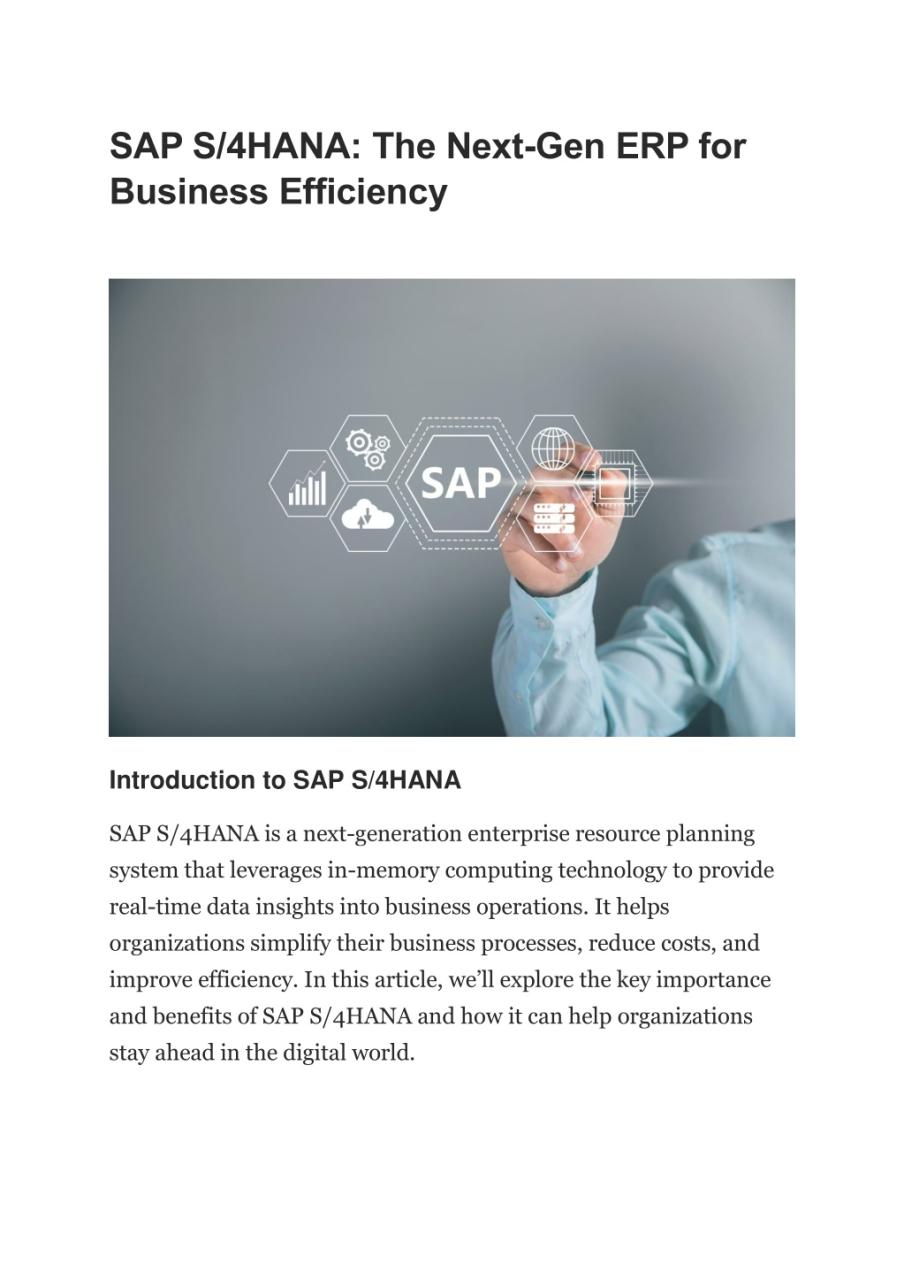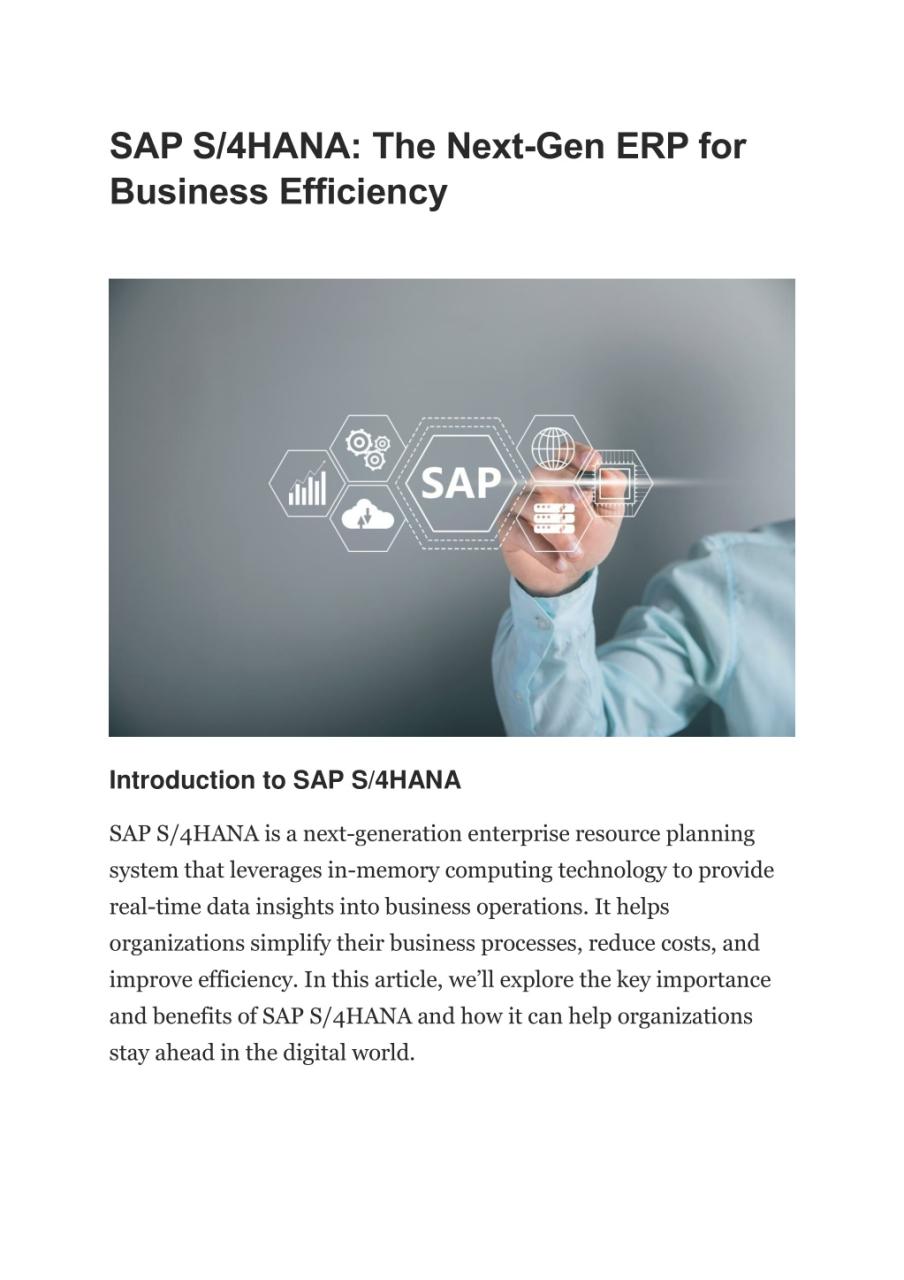SAP S/4HANA ERP: A Comprehensive Guide to the Next-Generation ERP System
Introduction
Enterprise Resource Planning (ERP) systems have become indispensable for businesses of all sizes, providing a centralized platform to manage and integrate critical business processes. Among the leading ERP solutions, SAP S/4HANA ERP stands out as a cutting-edge system that leverages advanced technologies to deliver unparalleled efficiency and agility. This comprehensive guide delves into the world of SAP S/4HANA ERP, exploring its capabilities, benefits, and considerations.
What is SAP S/4HANA ERP?
SAP S/4HANA ERP is the next-generation ERP system from SAP, designed to empower businesses with real-time insights, intelligent automation, and seamless integration. Built on the SAP HANA in-memory database, S/4HANA ERP offers unprecedented speed, scalability, and data processing capabilities.
Key Features of SAP S/4HANA ERP
- Real-Time Data Processing: S/4HANA ERP processes data in real time, providing businesses with up-to-the-minute visibility into their operations. This enables faster decision-making and more agile responses to changing market conditions.
- Intelligent Automation: The system leverages machine learning and artificial intelligence (AI) to automate repetitive tasks, reduce errors, and improve efficiency. This frees up valuable time for employees to focus on strategic initiatives.
- Simplified User Experience: S/4HANA ERP features a modern, intuitive user interface that simplifies navigation and streamlines workflows. This user-friendly design enhances productivity and reduces training time.
- Extensibility and Integration: S/4HANA ERP is highly extensible and can be easily integrated with other systems, such as CRM, PLM, and SCM. This allows businesses to create a tailored ERP solution that meets their specific needs.
- Cloud Deployment: S/4HANA ERP can be deployed on-premises or in the cloud. Cloud deployment offers greater flexibility, scalability, and cost-effectiveness, making it an attractive option for many businesses.
 .
.
Benefits of SAP S/4HANA ERP
- Increased Efficiency: S/4HANA ERP streamlines business processes, reduces manual tasks, and improves data accuracy. This leads to significant efficiency gains and cost savings.
- Improved Decision-Making: Real-time data processing and advanced analytics capabilities empower businesses with the insights they need to make informed decisions. This can lead to improved profitability, reduced risks, and increased customer satisfaction.
- Enhanced Agility: S/4HANA ERP enables businesses to respond quickly to changing market conditions and customer demands. This agility is essential for staying competitive in today’s fast-paced business environment.
- Reduced IT Complexity: S/4HANA ERP consolidates multiple systems into a single platform, reducing IT complexity and maintenance costs. This simplifies IT management and frees up resources for other initiatives.
- Innovation Catalyst: S/4HANA ERP provides a foundation for digital transformation and innovation. Its open architecture and extensibility allow businesses to integrate emerging technologies and develop custom applications that drive competitive advantage.
 .
.
Considerations for Implementing SAP S/4HANA ERP
- Cost: SAP S/4HANA ERP is a significant investment, and businesses should carefully consider the costs of implementation, maintenance, and training.
- Complexity: Implementing S/4HANA ERP is a complex undertaking that requires careful planning and execution. Businesses should engage experienced consultants to ensure a successful implementation.
- Data Migration: Migrating data from legacy systems to S/4HANA ERP can be challenging. Businesses should develop a comprehensive data migration strategy to minimize risks and ensure data integrity.
- Change Management: Implementing S/4HANA ERP can impact business processes and workflows. Businesses should invest in change management initiatives to ensure that employees are prepared for and embrace the new system.
- Technical Requirements: S/4HANA ERP requires specific hardware and software requirements. Businesses should assess their IT infrastructure and make necessary upgrades to ensure optimal performance.
Advantages and Disadvantages of SAP S/4HANA ERP
Advantages:
- Real-time data processing: Provides up-to-the-minute visibility into business operations.
- Intelligent automation: Frees up employees from repetitive tasks, reducing errors and improving efficiency.
- Simplified user experience: Streamlines navigation and workflows, enhancing productivity.
- Extensibility and integration: Allows businesses to tailor the ERP solution to their specific needs.
- Cloud deployment: Offers flexibility, scalability, and cost-effectiveness.
Disadvantages:
- Cost: Significant investment required for implementation, maintenance, and training.
- Complexity: Complex implementation process requiring experienced consultants.
- Data migration: Can be challenging, requiring a comprehensive data migration strategy.
- Change management: Requires careful planning and execution to ensure employee adoption.
- Technical requirements: Specific hardware and software requirements may require upgrades.
Essential Information about SAP S/4HANA ERP
- Target Audience: Businesses of all sizes looking to modernize their ERP systems and gain a competitive edge.
- Industries: Suitable for various industries, including manufacturing, retail, healthcare, and financial services.
- Deployment Options: On-premises or cloud deployment options available.
- Pricing: Varies depending on the size of the business and the scope of implementation.
- Support: Comprehensive support from SAP and certified partners available.
FAQs
- What is the difference between SAP S/4HANA ERP and previous SAP ERP versions?
- S/4HANA ERP is built on the SAP HANA in-memory database, providing real-time data processing and advanced analytics capabilities.
- Can SAP S/4HANA ERP be integrated with other systems?
- Yes, S/4HANA ERP is highly extensible and can be easily integrated with other systems, such as CRM, PLM, and SCM.
- Is SAP S/4HANA ERP suitable for small businesses?
- Yes, S/4HANA ERP is available in a variety of editions tailored to businesses of all sizes.
- What are the costs associated with SAP S/4HANA ERP?
- The costs vary depending on the size of the business and the scope of implementation.
- How long does it take to implement SAP S/4HANA ERP?
- The implementation timeline varies depending on the complexity of the project.
- What is the ROI of implementing SAP S/4HANA ERP?
- The ROI can be significant, with businesses reporting improved efficiency, increased revenue, and reduced costs.
- Is SAP S/4HANA ERP cloud-ready?
- Yes, S/4HANA ERP can be deployed on-premises or in the cloud.
- What are the benefits of deploying SAP S/4HANA ERP in the cloud?
- Cloud deployment offers greater flexibility, scalability, and cost-effectiveness.
- How can I learn more about SAP S/4HANA ERP?
- SAP provides a variety of resources, including webinars, documentation, and training programs.
Conclusion
SAP S/4HANA ERP is a transformative ERP solution that empowers businesses with real-time insights, intelligent automation, and seamless integration. By embracing S/4HANA ERP, businesses can achieve significant efficiency gains, improve decision-making, and gain a competitive edge in today’s digital landscape.
Disclaimer
The information provided in this article is for general knowledge purposes only and should not be construed as professional advice. Businesses should consult with experienced SAP consultants to assess their specific needs and determine the best course of action for implementing SAP S/4HANA ERP.
 .
.



